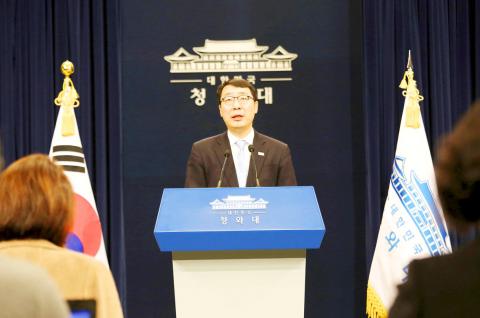South Korea’s president will send a delegation led by his national security director to North Korea today for talks on how to ease nuclear tensions and help arrange the restart of dialogue between Pyongyang and Washington, officials said yesterday.
They would be the first known South Korean special envoys to travel to Pyongyang in about 10 years.
Their trip comes amid a rare moment of goodwill between the rivals stemming from the Pyeongchang Winter Olympics.

Photo: AP
The 10-member delegation headed by South Korean National Security Director Chung Eui-yong is to fly to Pyongyang this afternoon for a two-day visit that includes talks with unidentified senior North Korean officials.
The discussions will deal with how to promote peace on the Korean Peninsula, improve ties between the Koreas and foster an environment to realize the resumption of talks between Pyongyang and Washington, South Korean President Moon Jae-in’s office said.
After its Pyongyang trip, the delegation is to visit Washington to brief US officials about its talks with the North Korean officials, senior presidential official Yoon Young-chan said at a televised news conference.
He said the delegation would include South Korean National Intelligence Service Director Suh Hoon and Vice Unification Minister Chun Hae-sung.
US officials have said North Korea must take serious disarmament steps before talks can restart, and North Korea has insisted it will not place its nuclear program on the negotiating table.
South Korea has sent special envoys to Pyongyang in the past to reach breakthrough deals aimed at reducing animosities and securing higher-level talks. The Koreas’ two past summit talks, one in 2000 and the other in 2007, were both held after ranking South Korean officials went to Pyongyang and worked out details of the summits in advance.
The last known South Korean special envoy to travel to Pyongyang was the nation’s intelligence chief, who visited a few months before the 2007 summit.
During the recently concluded Olympics, the two Koreas fielded their first joint Olympic squad in women’s ice hockey and had their athletes parade together during the opening ceremony.
North Korean leader Kim Jong-un also sent senior officials, including his influential younger sister, to the start and close of the Games, and they met Moon and conveyed Kim’s invitation to visit Pyongyang for what would be the third inter-Korean summit.
Those North Korean officials also told Moon that they were willing to restart talks with the US.
US President Donald Trump responded by saying talks will happen only “under the right conditions.”
Moon has yet to accept Kim’s invitation to visit Pyongyang.

AGING: As of last month, people aged 65 or older accounted for 20.06 percent of the total population and the number of couples who got married fell by 18,685 from 2024 Taiwan has surpassed South Korea as the country least willing to have children, with an annual crude birthrate of 4.62 per 1,000 people, Ministry of the Interior data showed yesterday. The nation was previously ranked the second-lowest country in terms of total fertility rate, or the average number of children a woman has in her lifetime. However, South Korea’s fertility rate began to recover from 2023, with total fertility rate rising from 0.72 and estimated to reach 0.82 to 0.85 by last year, and the crude birthrate projected at 6.7 per 1,000 people. Japan’s crude birthrate was projected to fall below six,

Conflict with Taiwan could leave China with “massive economic disruption, catastrophic military losses, significant social unrest, and devastating sanctions,” a US think tank said in a report released on Monday. The German Marshall Fund released a report titled If China Attacks Taiwan: The Consequences for China of “Minor Conflict” and “Major War” Scenarios. The report details the “massive” economic, military, social and international costs to China in the event of a minor conflict or major war with Taiwan, estimating that the Chinese People’s Liberation Army (PLA) could sustain losses of more than half of its active-duty ground forces, including 100,000 troops. Understanding Chinese

US President Donald Trump in an interview with the New York Times published on Thursday said that “it’s up to” Chinese President Xi Jinping (習近平) what China does on Taiwan, but that he would be “very unhappy” with a change in the “status quo.” “He [Xi] considers it to be a part of China, and that’s up to him what he’s going to be doing, but I’ve expressed to him that I would be very unhappy if he did that, and I don’t think he’ll do that. I hope he doesn’t do that,” Trump said. Trump made the comments in the context

SELF-DEFENSE: Tokyo has accelerated its spending goal and its defense minister said the nation needs to discuss whether it should develop nuclear-powered submarines China is ramping up objections to what it sees as Japan’s desire to acquire nuclear weapons, despite Tokyo’s longstanding renunciation of such arms, deepening another fissure in the two neighbors’ increasingly tense ties. In what appears to be a concerted effort, China’s foreign and defense ministries issued statements on Thursday condemning alleged remilitarism efforts by Tokyo. The remarks came as two of the country’s top think tanks jointly issued a 29-page report framing actions by “right-wing forces” in Japan as posing a “serious threat” to world peace. While that report did not define “right-wing forces,” the Chinese Ministry of Foreign Affairs was